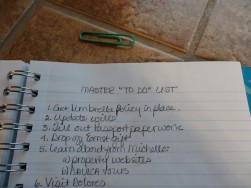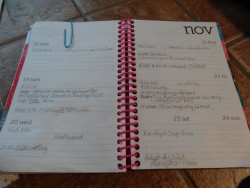This week, I looked at the calendar and realized how long it had been since I’d blogged. Where did the time go? lol 🙂 You would think that someone who was edumacated and a smartie-pants would instinctively know good time management, but no, life doesn’t work that way.
I am always looking for better ways to do things.
For instance, I love lists. (See the picture above?) That’s all my lists.
When you’re self-employed, you become in charge of your own schedule. And since what you put into your business is what you get back, it’s important to be productive and maximize your time working so that you can truly enjoy your downtime and have fun, rather than play guilty. 🙂
If you also happen to be a visionary, it’s even worse. The curse of being a visionary is that you can see the big picture of what needs to be done. Thus, life becomes one big ‘to do’ list!
If you’ve been a regular reader of my blog, you might remember that I have a constant stream of non-punctuated sentences running through my head on any particular day. To keep my mind as quiet as possible, I write it on a list, and then I can forget about trying to remember it.
Did I mention I love lists?
Anyway, I have a lot of lists, all of which I use, and all of them are different.
I have a list for large projects that I plan to work on when I have time.
A list for the projects I want to do at home.
 A shopping list for decorating projects.
A shopping list for decorating projects.
 My Master List, from which I make notes of things I need to do. I check this frequently, and pull items to complete from it when I have time.
My Master List, from which I make notes of things I need to do. I check this frequently, and pull items to complete from it when I have time.
My calendar even has small lists or reminders along with appointments. (And by the way, my calendar has to have pages with the months, because I like to see my month laid out in front of me…and space to make lists on the weekdays. 🙂
This does not include my grocery list, Wal-mart list, and shopping list for any time I’m at Sam’s Club or Kohl’s. (Yes, those are separate lists.)
Can you tell I love lists?
So a few weeks ago, my schedule began to ramp up, and I began to worry that I would forget things. I was wearing myself out trying to remember what I didn’t want to forget!
With a desire for efficiency and productivity paired with the satisfaction of crossing things OFF lists once they were done, it seemed totally natural to start making a daily list of appointments, errands, and tasks.
The theory seemed simple: I always carry a notebook with me which has most of my lists. When I had extra time in my day, I’d move over some things from my Master List.
It totally ramped up my productivity!
I was a Rock Star! I was getting so much done each day: tasks that had been lingering on my list for weeks were suddenly getting done. Errands were getting ran. I was crossing things off like crazy! It was awesome. I was like the Tasmanian Devil, spinning through the day.
I was also more stressed.
And I wasn’t happy. I wasn’t having any fun. Life suddenly felt like one big “To Do” list and I realized I simply wasn’t enjoying my days near as much. Was this all life was??
And then, one day this week I had an hour of uninterrupted time where there was nothing else I could do but wait. So I started reading through a backlog of emails.
Dr. Alan Zimmerman is a motivational speaker. I’ve subscribed to his newsletter for years, “Dr. Zimmerman’s Tuesday Tip.” It just so happened the topic of it was “Time Management Strategies.” For a list-maker, this was going to be eye candy.
As I read it, I realized that I’d been working very efficiently, I hadn’t been working very effectively.
I’ve excerpted parts of his newsletter here, in italics:
Hmmmm. This made a lot of sense to me! I was interested to read more.
I hate to say it, but there is never enough time for everything in life. One of keys to success is to spend your time on the really valuable things instead of the low-payoff activities.
Quite often, things that have a high payoff do not have a high urgency. They are things that would be great to do … like investing in your team’s development, building a stronger marriage, or getting yourself in better shape physically and financially … but are easily put off until later. Don’t fall into that trap!
Suddenly, a one-million candlepower light went off in my head. (And those do exist, I have one.) 😉
I realized that I was so addicted to crossing things off my list – being productive – that I wasn’t focusing on the high-priority items: the things that really meant a lot to me and that I enjoyed. The highest priority work, which I should do first, was getting pushed back by the smaller stuff; leaving the bigger things unaddressed raised my stress level. For instance, blogging is a high-priority item for me…but I was pushing it back to accomplish other, smaller objectives.
This light-bulb moment totally refocused the way I do my daily planning. Now, I focus on my high-priority, high payoff items first. The details can come later, as I have time. Because I will never get it all done.
I still have my daily list; I just now focus on my high-priority items first. And, I’m MUCH happier. And you know what? I’ve gotten some things done since then that should have been a high priority months ago. They just weren’t urgent. And I feel good, because by doing them I helped advance my business. Funny how that works. Life is good. 🙂







